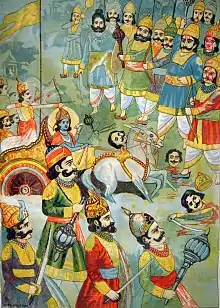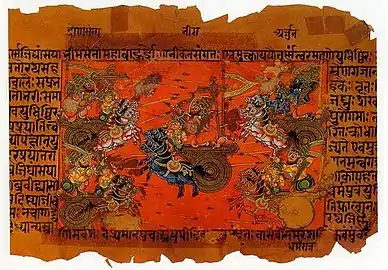Kaurava
Kaurava is a Sanskrit term for the descendants of King Kuru (or simply Kurava in Tamil), a legendary king who is the ancestor of many of the characters of the Mahābhārata. The well-known Kauravas are Duryodhana, Dushasana, Vikarna, Yuyutsu and Dussala. Yuyutsu is not the son of Gandhari, but he is the same age as Duryodhana and Bhima.

Etymology
The term Kauravas is used in the Mahabharata with three meanings:
- The wider meaning is used to represent all the descendants of Kuru. This meaning, which includes the Pandava brothers, is often used in the earlier parts of popular renditions of the Mahabharata.
- The narrower but more common meaning is used to represent the elder line of the descendants of Kuru. This restricts it to the children of King Dhritarashtra, excluding the children of his younger brother, Pandu, whose children form the Pandava line.
The rest of this article deals with the Kaurava in the narrower sense, that is, the children of Dhritarashtra by Gandhari. When referring to these children, a more specific term is also used – Dhārtarāṣṭra (Sanskrit: धार्तराष्ट्र), a derivative of Dhritarashtra.
Birth of Kauravas
After Gandhari was married to Dhritarashtra, she wrapped a bandage over her eyes and vowed to share the darkness that her husband lived in. Gandhari's brother Shakuni came to live with them to look after the interests of Gandhari. Once Sage Dwaipayan Vyasa came to visit Gandhari in Hastinapur. She took great care of the comforts of the great saint and saw that he had a pleasant stay in Hastinapur. The saint was pleased with Gandhari and granted her a boon. Gandhari wished for one hundred sons who would be as powerful as her husband. Dwaipayan Vyasa granted her the boon and in due course of time, Gandhari found herself to be pregnant. But two years passed and still, the baby was not born.[1] Meanwhile, Kunti received a son from god Yama whom she called Yudhishthira. After two years of pregnancy, Gandhari gave birth to a hard piece of lifeless flesh that was not a baby at all. Gandhari was devastated as she had expected a hundred sons according to the blessing of Rishi Vyasa. She was about to throw away the piece of flesh while Rishi Vyasa appeared and told her that his blessings could not have been in vain and asked Gandhari to arrange for one hundred jars to be filled with ghee. He told Gandhari that he would cut the piece of flesh into a hundred pieces and place them in the jars, which would then develop into the one hundred sons that she so desired. Gandhari told Vyasa then that she also wanted to have a daughter. Vyasa agreed, cut the piece of flesh into one hundred and one-pieces, and placed them each into a jar. After two more years of patient waiting the jars were ready to be opened. Bhima was born a day after Duryodhana was born thus making him younger than him. Arjuna, Nakula, and Sahadeva were born after Duryodhana was born.[2]
Children of Dhritarashtra
The children of Dhritarashtra by Gandhari are also referred by a more specific and frequently encountered term - Dhārtarāṣṭra, a derivative of Dhṛtarāṣṭra (Dhritarashtra).
According to the epic, Gandhari wanted a hundred sons and Vyasa granted her a boon that she would have these. Another version says that she was unable to have any children for a long time and she eventually became pregnant but did not deliver for two years, after which she gave birth to a lump of flesh. Vyasa cut this lump into a hundred and one-pieces and these eventually developed into a hundred boys and one girl.[3]
The birth of these children is relevant to the dispute over the succession of the kingdom's throne. It attributes the late birth of Duryodhana, the eldest son of Dhritarashtra, despite his father's early marriage and legitimizes the case for his cousin Yudhishthira to claim the throne, since he could claim to be the eldest of his generation. All the sons of Dhritarashtra excluding Yuyutsu (born of Dhritarashtra's marriage with a Vaishya woman, thus a half-brother of Duryodhana) were killed in the great battle at Kurukshetra.
Quote from Mahabharata, Sambava Jayesh, Section 115(CXV in Roman Numerals):[4]
"And during the time when Gandhari was in a state of advanced pregnancy, there was a maidservant of the Vaishya class who used to attend on Dhritarashtra. During that year, the O king was begotten upon her by the illustrious Dhritarashtra a son endued with great intelligence who was afterwards named Yuyutsu. And because he was begotten by a Kshatriya upon a Vaishya woman, he was subject to the constant taunts of the Kaurava.
Thus were born unto the wise Dhritarashtra, a hundred sons who were all heroes and mighty chariot-fighters, and a daughter over and above the hundred and another son Yuyutsu of great energy and prowess begotten upon a Vaishya woman."
Names of the Kauravas
Names of the Kauravas are recorded in the Mahabharata.[5]
- Duryodhana
- Dushyasana
- Vikarna
- Jalagandha
- Sama
- Saha
- Vindha
- Anuvindha
- Durmukha
- Chitrasena
- Durdarsha
- Durmarsha
- Dussaha
- Durmadha
- Chitrasena
- Dushkarna
- Durdhara
- Vivinsati
- Durmarshana
- Durvishaha
- Durvimochana
- Dushpradharsha
- Durjaya
- Jaitra
- Bhurivala
- Ravi
- Jayatsena
- Sujata
- Srutavan
- Srutanta
- Jaya
- Chitra
- Upachitra
- Charuchitra
- Chitraksha
- Sarasana
- Chitrayudha
- Chitravarman
- Suvarma
- Sudarsana
- Dhanurgraha
- Vivitsu
- Subaahu
- Nanda
- Upananda
- Kratha
- Vatavega
- Nishagin
- Kavashin
- Paasi
- Vikata
- Soma
- Suvarchasas
- Dhanurdhara
- Ayobaahu
- Mahabaahu
- Chithraamga
- Chithrakundala
- Swarva
- Bheemavega
- Bheemabela
- Ugraayudha
- Kundhaadhara
- Vrindaaraka
- Dridhavarma
- Dridhakshathra
- Dridhasandha
- Dussalan
- Sathyasandha
- Sadaasuvaak
- Ugrasravas
- Bheemadrath
- Senaany
- Aparaajitha
- Kundhasaai
- Dridhahastha
- Suhastha
- Suvarcha
- Aadithyakethu
- Ugrasaai
- Kavachy
- Kradhana
- Kundhy
- Bheemavikra
- Alolupa
- Abhaya
- Dhridhakarmaavu
- Dhridharathaasraya
- Anaadhrushya
- Kundhabhedy
- Viraavy
- Chithrakundala
- Pradhama
- Amapramaadhy
- Deerkharoma
- Suveeryavaan
- Dheerkhabaahu
- Kaanchanadhwaja
- Kundhaasy
- Virajas
- Duhsala(Daughter)[6]
- Yuyutsu(Half-Brother)
In literature
Harivamsa Purana (8th century CE) narrates the Jain version of their story.[7]
Marriages and children of Kauravas
All the 100 Kauravas were mentioned to have wives in the Adi Parva.[8] Some of them had children - Duryodhana was mentioned to have a Kalinga princess as his wife, named in folklores as Bhanumati. They had 2 children - a son Laxman Kumara and a daughter Lakshmana. Lakshman Kumar participated in the Kurukshetra War and killed Shikhandi's son Kshatradeva. He is killed by Abhimanyu on the 13th day of the War.
Lakshmana was said to have married Krishna's son Samba, and they had a son Ushneek.
Dushasana was also said to have a son, who killed Abhimanyu in the war. Dushasana's son was ultimately killed by Shrutasena in the War. Chitrasena's son was said to have been killed by Shrutakarma in the Kurukshetra War.
However, it was mentioned that all these sons of the Kauravas were killed by the sons of the Pandavas.
See also
Notes
- "Kauravas". Ancient History Encyclopedia. Retrieved 5 May 2020.
- "Mahabharat Chapter 6 - Birth of Pandavas and Kauravas". Archived from the original on 24 September 2015. Retrieved 3 September 2015.
- The Birth of the Pandavas and Kauravas
- http://www.sacred-texts.com/hin/m01/m01116.htm>
- https://books.google.co.in/books?id=gzN2_fu0mIYC&pg=PA221&dq=Bhanumati+and+Karna&hl=en&sa=X&ved=2ahUKEwiU0pqetPfsAhWDoOkKHQ0rDtwQ6AEwB3oECAkQAg#v=onepage&q=Duryodhana%20Dusshasana%20Dussahas%20Jalagandha&f=false
- "Unveiling the secret of Duhsala, the only sister of 100 Kaurava Brothers". Detechter. 24 October 2017. Retrieved 3 September 2020.
- Upinder Singh 2016, p. 26.
- https://www.sacred-texts.com/hin/m01/m01118.htm
Sources
- Singh, Upinder (2016), A History of Ancient and Early Medieval India: From the Stone Age to the 12th Century, Pearson Education, ISBN 978-93-325-6996-6
